Simple Question #7 - What is Space? Is It Really a Static Infinite Void?
So how are you guys? Thank you so much for consistently supporting this series.
After 'TIME', it's time for 'SPACE'. I hope you are taking care of your personal space nicely. But, the 'space' we are going to discuss is different. This 'Space' is what physicists call "Space". You might think this time this simple question about space is really simple because we know it is the emptiness. Well, is it really that simple?
Let's find out!
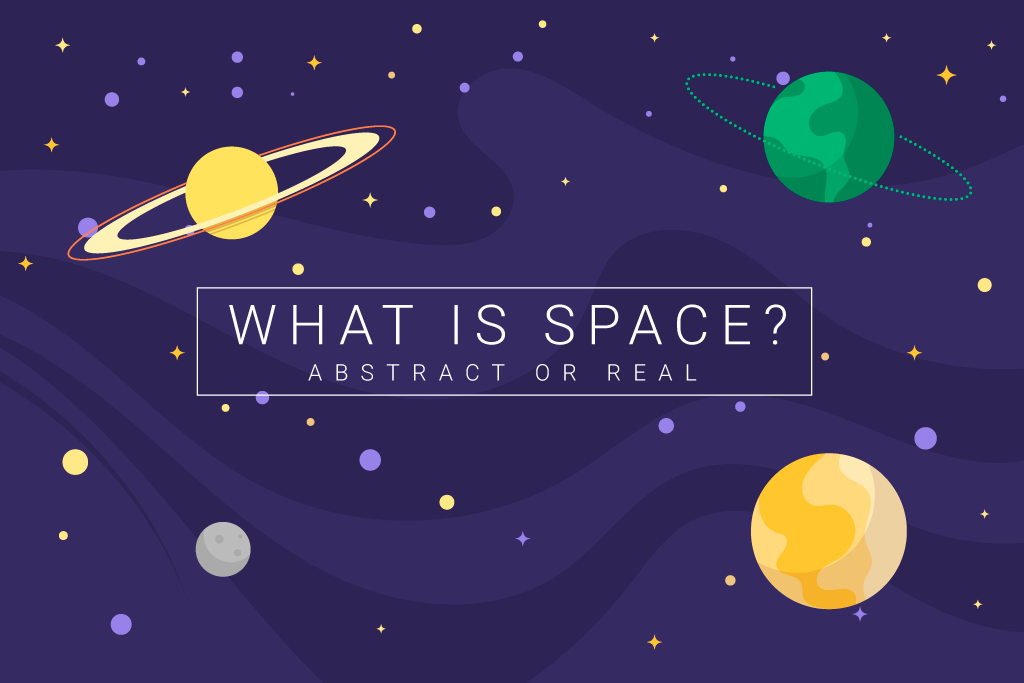
What is Space | Freepik
According to Wikipedia:
“Space is the boundless three-dimensional extent in which objects and events have relative position and direction.” [1]
Space is one of those fundamental entities (like time and mass), which are with us since the beginning. It is so much integrated in our understanding of the universe, that we expect to know everything about it. But like many (previously discussed) deep questions, the question of “What space is?” sounds like simple one at first. But if we re-examine the question, by going against our intuition, we discover that a clear answer is hard to find.
Most people imagine that space is just the emptiness where things exist and perform their action. Just like an empty stage on which the events of the universe play out. Well, space has been an interesting topic to be discussed and debated for philosophers since ancient time.
This debate related to nature, essence and mode of existence of space dates back to the age of Plato, Socrates and Aristotle. The evidence of the study about space is found in the Timaeus of Plato. Socrates also gave his reflections on what the Greeks called khôra (i.e. space) and Aristotle in the Book IV, Delta of his Physics gave the definition of ‘topos’ (i.e. place). [1]
Philosophers kept on suggesting new ideas and theories about space. German philosopher-mathematician, Gottfried Leibniz argued that
“space is in fact a relationship between objects defined by their distance and direction from one another.” [2]
His ideas suggested that since space is just the relation between individual matter and their possible locations and therefore it cannot be continuous but must be discreet. He also believed that we can’t have pure ’empty space’ because the idea of any space beyond the last piece of matter doesn’t make any sense. We can’t measure the distance between two particles if we don’t have any particles. The concept of space would end at the very moment when there are no more particles to define it. Philosophy of Leibniz throws light on the fact that if matter is finite in the universe, then space must also be finite.
This philosophy is really weird and counterintuitive, especially when it is given that we never experienced the concept of non-space. (But in Physics, sometimes weird things are true, so keep an open mind.)
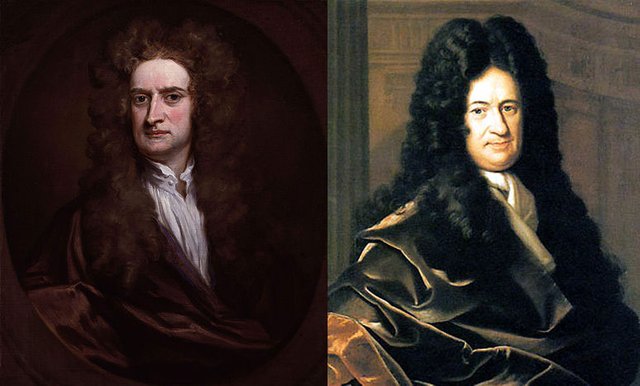
Newton (left) and Leibniz (right)
Well, his ideas also shocked Isaac Newton. Newton had just an opposite view regarding ‘space’. According to him, space was absolute and that it could exist permanently and independently without the presence of matter. It is a void that can exist by itself, waiting to be filled. [3] For example, if we imagine a finite amount of matter in the universe, then we could imagine travelling so far that we shall reach to a certain point beyond which there is no more stuff. At that point we will be facing a pure empty space, which actually extends out to infinity.
This picture of space looks reasonable and confirms with our experience of the universe. But history has taught us that, sometimes when we believe something to be very true and logical (like “Earth is flat”) we should be skeptical about that and take a step back and re-examine the thing carefully.
So, which of these ideas about space is correct? Does the space exist only in the context of matter? Or is it like an infinite void waiting to be filled?
Well, the answer is, it is neither of the two: Space is definitely not an empty void and it is definitely not just our relationship between objects. We know this because we have observed space do things which fit neither of these ideas. We have observed space bend, expand and even ripple. This is the part where your brain goes “Whaaaat…..?”
Yeah this is really weird and confusing, but this is what our physicists have actually discovered.
Does Space Exhibit Physical Properties?
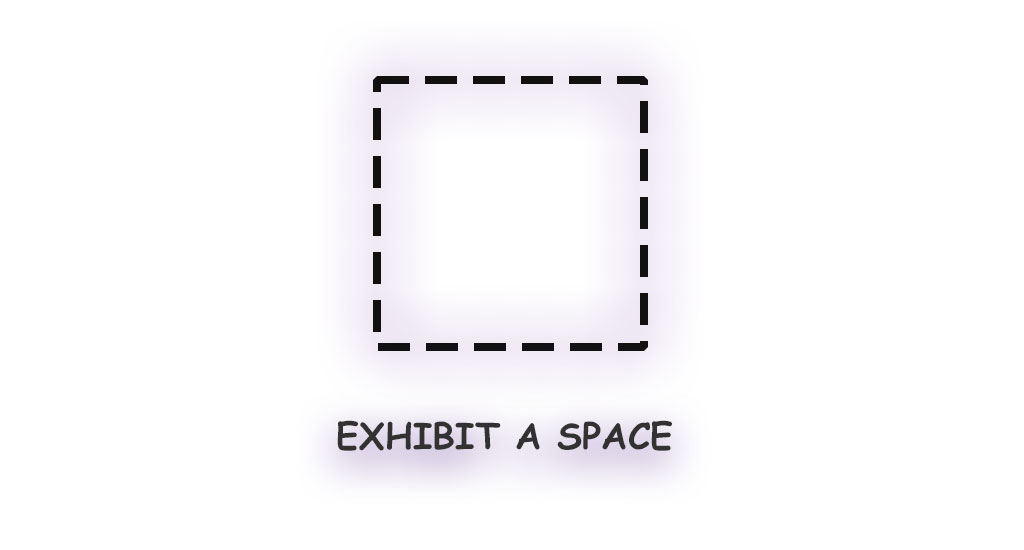
Can we really define Space?
If you are regularly reading my articles with good attention, you might be a little confused when you read the phrases “bending of space” and “expanding of space”. What could that possibly mean? How does it make any sense?
If space is an idea, then it can’t bend or expand. If space is our ruler for measuring the location of objects, then how can we measure the bending or expanding of space itself?
Good question! The reason behind this idea of space bending being so confusing is that, most of us grow with a picture of space as an invisible backdrop in which things happen.
Most of us imagine space to be like that theatre stage, we mentioned before, with hard wooden planks as the floor and rigid walls on all sides. And you imagine nothing in the universe can bend that stage because this abstract frame is not the part of the universe but something that contains the universe.
This is where our imagination about space goes wrong. To understand the modern concept of space and for the general relativity to make sense, we must give up the idea that space is an abstract stage and accept that it is actually a physical thing. We have to imagine that space has properties and behaviour and it reacts to the matter in the universe. We can pinch it, squeeze it and even fill it with anything (which we do actually).
After reading all this, you may have been thinking “What nonsense this article is talking about?” And you may have decided to stop. But if you are firm enough to continue, be prepared to bear with it, because the real craziness is yet to come.
You will start understanding the thing by the time we are done. But we need to unpack these concepts carefully, so that you grasp the ideas effectively and appreciate the truly strange and basic mysteries about space that remain unanswered.
How can space show physical properties like rippling and bending? What does that actually mean?
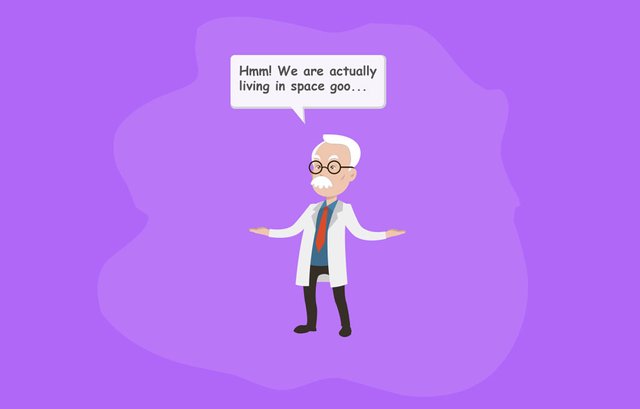
Space is like a goo | Freepik
It means that instead of being like an empty room space is more like a huge blob of thick goo. Normally things can move around inside goo, just like we can move around inside a room full of air without noticing all the air particles. But under certain circumstances this space-goo can bend, changing the paths of objects moving through it.
However, this goo is not a perfect analogy for the true nature of space, but it at least gives an idea that the space you are sitting in right now is not necessarily fixed and abstract. Instead, it is like a concrete thing which can expand, bend and ripple in such a way that we cannot perceive it.
Maybe a ripple of space just passed through you. Maybe we are being stretched in an odd direction with space, and we don’t even know. Or maybe space is sitting silently and going nowhere but we can’t perceive that as well. This is why we normally confuse space with nothingness.
But, what can the space-goo do? It turns out that it can do a lot of weird things.
Space Can Expand
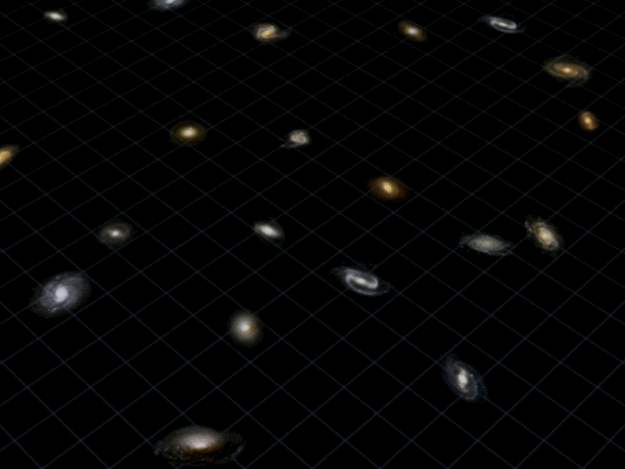
Expansion of Space resulting in Big Rip | Hubblesite/Greg Bacon (STScl)
Let’s think carefully for a moment about what it means for space to expand. It means that things get farther apart from each other without actually moving through the space-goo. In our analogy, imagine that you are sitting in the goo and it suddenly starts growing. And if you are sitting in front of another person, you will find that the person is now farther away from you without either of you have moved relative to the goo.
How could we know if the goo has expanded? Wouldn’t a ruler we use to measure the distance also expand? Well, if use a soft taffy ruler then it would definitely expand. But if you use a rigid ruler with all its atoms tightly packed together (with electromagnetic forces), then the ruler would stay the same length, allowing you to measure the expansion of space.
And we know that space can expand because we have seen it expanding – this is how dark energy was discovered. We know that space expanded and stretched at unimaginable rate at the time of big bang and that a similar expansion is it still going on.
Space Can Bend
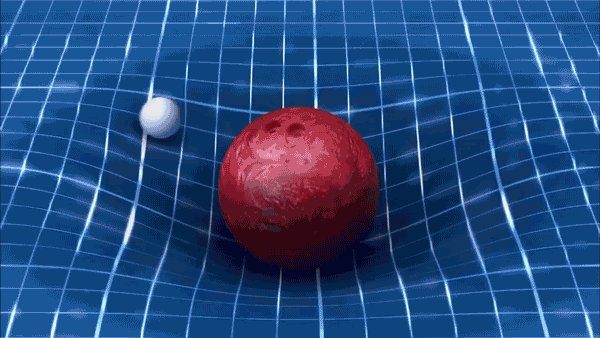
Bending of Space-Time due to Mass | The Verge
We also know that space can bend. Our space-goo can be squeezed and deformed. In Einstein’s general relativity, this is what gravity is – the bending of space. When something has mass, it causes space around it to distort and change shape.
When space changes shape, objects do not move through it in a path you might first imagine. Rather than moving in a straight line, a cricket ball passing through a blob of bent space-goo will curve along with it. And if the goo is severely distorted by some massive object then the cricket ball might even move in a loop around it — in the same way the moon revolves round the Earth, or the Earth moves around the Sun.
And this is something which we actually see with our naked eyes! Light, for example, bends its path when it passes near a massive object like our Sun or a black-hole. If gravity was just the force between objects with mass, then how the photons of light which are said to have no mass get attracted towards these massive objects? The only reason we can point out is that, the space is actually distorted by the massive objects and as a result the path of light which passes through that distorted space gets curved.
Space Can Ripple
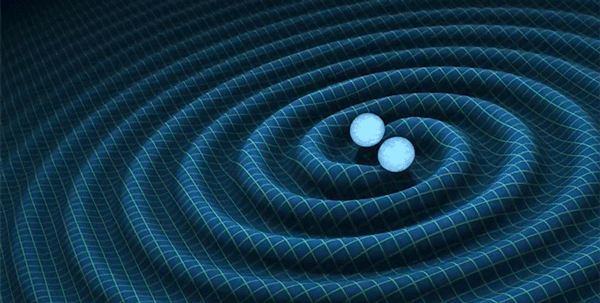
Gravitational Waves – Ripples of Space
Again, we also know that space can ripple. This is actually not very unlikely to imagine when we know that space can bend and expand. But what is more interesting is that, this stretching and bending of space can propagate through our space-goo : this is called gravitational waves. If something massive causes a sudden distortion of space, that distortion will radiate outward like a sound wave or a ripple inside a liquid. You can think of these ripples as waves of space stretching and compressing.
We know the ripple behaviour is real because:
- Einstein’s general relativity predicts it.
- We have actually sensed these ripples recently. Somewhere in the universe, two massive black-holes got locked in a spin around each other and thus creating huge distortion in the space, which got radiated outwards. Using very sensitive equipment, we detected those space ripples here on Earth. [4]
These kinds of behaviour could only happen if space has a certain physical nature to it and is not just an abstract concept or pure emptiness.
Is Space Inside Something Else?
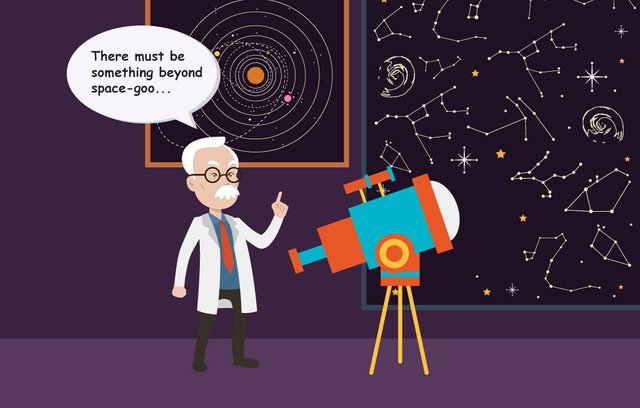
Is there anything outside this Space-goo? | Freepik
Now we can say that space is a thing and not just pure emptiness, this is what experience of the universe tells us. But while thinking space as a dynamic thing with physical properties which cause it to stretch and bend, it only leads to more questions.
You may be tempted to say that if space is like a goo which can stretch and bend, then it must be inside some other empty thing which we can call ‘space’ again. This is really a clever idea but as far as we know, space doesn’t need to be inside anything else. When it bends and curves, this is intrinsic bending that changes relationships between its parts, not the whole space-goo is bending relative to some larger room that it fills.
But it doesn’t mean that if space doesn’t need to be inside anything, then it is not sitting inside something else. Perhaps, what we call space is sitting inside some larger ‘metaspace’. And perhaps, this metaspace is like infinite emptiness, but we have no clue.
Is it possible to have parts of the universe without space? In other words, if space is a goo can there be places without goo? This is a tough for us to imagine because all of our physical laws assume the existence of space. So what physical laws will operate outside space we can’t tell.
The fact is that this new idea of space as a physical thing has come recently, and we are in the very beginning of understanding what space actually is. Sometimes we are still hobbled by our intuitive notions about space. These notions served as well in early times, but now to dive very deep into the mysteries of this universe, we need to break the shackles of these concepts. We must now realize that space is very much different from what we imagined.
Conclusion
So we see, Space, which is everywhere and inside which we are living, is very much different from what we had imagined. However, now we have started discovering some mind blowing properties of space, but still we are unable to understand what exactly is space and why it happens to be in the way it is.
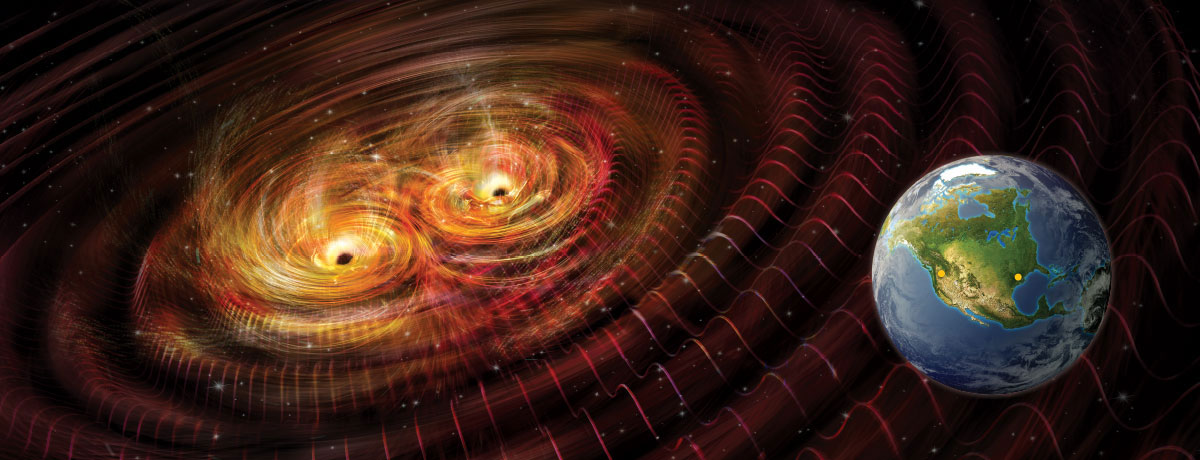
Ripple in Spacetime fabric – Gravitational Waves | ScienceNews
Maybe we are missing something to which this space is connected. According to Einstein, because of relativity of motion, space and time can be mathematically combined into one object : space-time. It becomes easier to understand the physics of the universe and bending and stretching of space if we consider space and time in combined form as a single entity. As we know that mass, which influences space also affects time. So, it is possible that space and time are a part of some larger continuum. Also space-time plane gives a better visualization of the gravitational waves and also explains the effect of mass and energy in a better way.
Perhaps, we are pretty much near to unveil the mysteries of space. Now we have the ability to detect the ripples of gravitational waves, to which we were deaf before. In the near future maybe we will understand more about the exact nature of space and get the answers of those deep questions which are literally all around us.
So don’t go anywhere before UPVOTING and RESTEEMING this post. And yes, save some space in your brain for the answers.
Source : http://thinknitesh.com/what-is-space/ (an excerpt from my blog)
Do share your ideas and views through your comments. Your feedback is important for me.
References
[1] – https://en.wikipedia.org/wiki/Space
[2] – Vailati, E, Leibniz & Clarke: A Study of Their Correspondence p. 115
[3] – https://en.wikipedia.org/wiki/Absolute_space_and_time
[4] – https://en.wikipedia.org/wiki/First_observation_of_gravitational_waves
[•] - Jorge Cham and Daniel Whiteson (2017) : We Have No Idea
Previous Episodes of the Series
- Simple Question #1 - Why do we Dream? What is its purpose?
- Simple Question #2 - What is Life? Why does it exist at all?
- Simple Question #3 - How big is the Universe? What is its Shape?
- Simple Question #4 - Should we eat Meat? Why and Why Not?
- Simple Question #5 - What is Time? Will it ever stop or reverse?
- Simple Question #6 - Do we all feel Time the same way? Can we travel back in Time?
Follow me @nitesh9



--- thinknitesh.com ---
Great summary of the nature of space. I think the analogy of a balloon makes sense when thinking about the expansion of space. Draw two dots on a partially filled balloon, then blow the balloon up. You will notice that the distance between the dots also increases. The discovery of gravitational waves is amazing as well. It really is like we are in some sort of "space goo" that can move. With time being weaved into space, this ripple or bending also causes perturbations in time.
Yeah, the balloon analogy is good for understanding expansion of space. However, we should keep in mind that space is not balloon shaped (spheroid). [Will be discussing this in the next post :D]
Thank you @theabsolute for such a nice thoughful feedback. :)
Great post! Enjoyed reading it.
Cool write up about space @nitesh9 !
Thank you so much. :)
(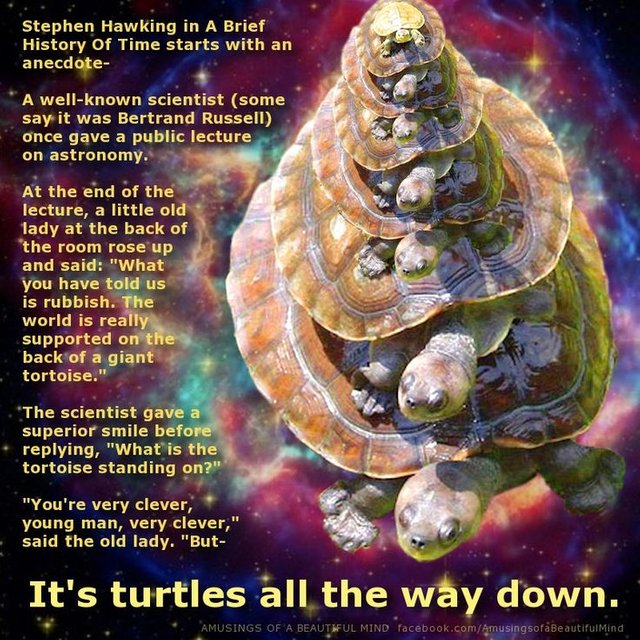 )
)
Ha ha. Nice one. :p
Haha, I think she is onto something!
nice
Thanks.
Thanks for sharing
i love your post
Thank you. :)
my comment is god bless you how you find subjects like this you re really a lucky man congratulations :-)
The more hot topic in physics is how space behaves in quantum level. Because both General relativity and Quantum Mechanics fail at some extreme regions like Black hole
Yeah, that hotter topic is saved for the next part. :D
Yeah, black holes are the regions where space is much strained and probably in those regions we could see space shredded and know the secrets.
And Quantum Space is another fantastic possibility. :D
Thanks for the awesome feedback. :)
Keep in touch. Dono ka same interest hai. Collaboration me kuch kar skte hain
Sure bro. :)
You on Discord or Steemit.chat?
yeah...search @physics-o-mania or Roshan
steemit.chat
Wow, awesome and very in depth post! :) I'm very happy I've discovered your work now ;)
Thank you so much. :)
My pleasure! :)
Very nice post, except one sentence:
Dark energy has not been discovered at all. We do not even know what it is. What we know, as a summary, is that it is one way to model the accelerated expansion of the universe. No more. And we are far fro having discovered it.
Except this little detail, as I said, this is a very nice post :)
Yeah that's right, Dark Energy is just a concept for now. Thanks for pointing out. :)
This the reason that I love your feedback, you read the article so minutely. Awesome!
Thank you so much @lemouth for appreciating this post. :)
:)